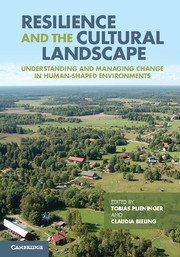 Resilience and the Cultural Landscape
Resilience and the Cultural Landscape Book contents
- Frontmatter
- Contents
- List of contributors
- Preface
- Part I Conceptualising landscapes as social–ecological systems
- Part II Analysing landscape resilience
- Part III Managing landscapes for resilience
- Part IV Perspectives for resilient landscapes
- 17 A heterarchy of knowledge: tools for the study of landscape histories and futures
- 18 Towards a deeper understanding of the social in resilience: the contributions of cultural landscapes
- 19 Resilience and cultural landscapes: opportunities, relevance and ways ahead
- Index
- References
17 - A heterarchy of knowledge: tools for the study of landscape histories and futures
Published online by Cambridge University Press: 05 November 2012
- Frontmatter
- Contents
- List of contributors
- Preface
- Part I Conceptualising landscapes as social–ecological systems
- Part II Analysing landscape resilience
- Part III Managing landscapes for resilience
- Part IV Perspectives for resilient landscapes
- 17 A heterarchy of knowledge: tools for the study of landscape histories and futures
- 18 Towards a deeper understanding of the social in resilience: the contributions of cultural landscapes
- 19 Resilience and cultural landscapes: opportunities, relevance and ways ahead
- Index
- References
Summary
Learning about Burgundy
In the mid-1970s, my colleague Bill Marquardt and I, with our students, began an archaeological project to excavate an Iron Age (Celtic) hill fort in Burgundy (France) called Mont Dardon. I had been there before, at least vicariously, in my years as a Latin student; the astonishing view of the landscape from Dardon’s summit is the setting for dramatic passages in Caesar’s Gallic Wars. The site was possibly an early capital of a polity called the Aedui, who were first Caesar’s allies and then his foes. Dardon was inhabited a thousand years before, during, and for fourteen hundred years after the Roman conquest. We realised that the site and its surrounding landscape provide the perfect setting for a tale only archaeology can tell – not in words carefully chosen by an ambitious general but in the ways life changed for those who dwelt in that landscape (Crumley & Marquardt, 1987).
Archaeology, although only one of the ways our project learns about the past, lies at the heart of our work in Burgundy. Most early team members were archaeologists trained within the discipline of anthropology, the broad-in-space and deep-in-time study of human behaviour. We wished to pose anthropological questions: How did Aeduan politics and economy change after the Conquest? What spiritual and social adjustments to Roman rule were made? How did the region fare when the Western Empire crumbled and groups from eastern and northern Europe arrived?
- Type
- Chapter
- Information
- Resilience and the Cultural LandscapeUnderstanding and Managing Change in Human-Shaped Environments, pp. 303 - 314Publisher: Cambridge University PressPrint publication year: 2012
References
- 9
- Cited by


